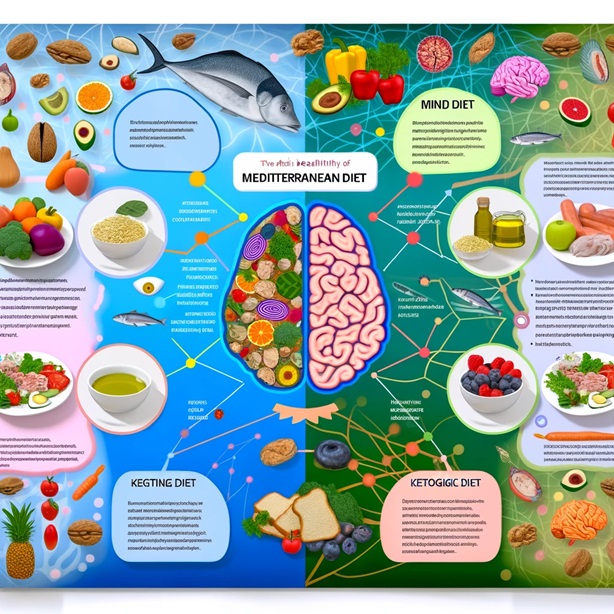Introduction to Brain-Healthy Diets
As research continues to unveil the profound impact of nutrition on cognitive function, several diets have been recognized for their potential brain health benefits. The Mediterranean diet, MIND diet, and ketogenic diet are among the most popular eating plans associated with cognitive improvements. This article delves into the characteristics of each diet and evaluates their scientific backing.
The Mediterranean Diet and Brain Health
The Mediterranean diet is rich in fruits, vegetables, whole grains, olive oil, and fish. It has been associated with a lower risk of cognitive decline and is touted for its high levels of antioxidants and healthy fats, which are believed to reduce inflammation and oxidative stress in the brain. Numerous studies have suggested that adherence to the Mediterranean diet correlates with better cognitive function and a reduced risk of developing Alzheimer's disease.
The MIND Diet: A Hybrid Approach
The MIND diet combines elements of the Mediterranean and DASH (Dietary Approaches to Stop Hypertension) diets to create an eating plan specifically aimed at reducing the risk of dementia and the decline in brain health that often comes with age. It emphasizes berries, leafy greens, nuts, whole grains, and fish, while discouraging red meats, sweets, and fried foods. Studies have shown that even moderate adherence to the MIND diet may improve cognitive resilience.
Ketogenic Diet: Brain Health Implications
The ketogenic diet, which is high in fats and low in carbohydrates, forces the body to burn fats rather than carbohydrates. There is evidence to suggest that this diet may have neuroprotective properties. It has been used as a treatment for epilepsy for many years and is currently being investigated for its potential to mitigate the symptoms of neurodegenerative diseases, although its long-term effects on brain health are still a subject of research.
Comparing the Diets
When comparing these diets, it's clear that they all share an emphasis on whole foods and a reduction in processed items. The Mediterranean and MIND diets have the most research to support their neuroprotective effects, while the ketogenic diet, despite its promising therapeutic potential, requires more evidence to be recommended for long-term brain health. Each diet has its merits, but it’s important to consider individual nutritional needs and lifestyle factors when choosing the right one for cognitive health.
Personalizing Your Diet for Brain Health
No one diet is the silver bullet for cognitive health. Individual differences in genetics, lifestyle, and nutritional requirements make personalized approaches necessary. Consulting with healthcare providers and nutritionists can help tailor dietary choices that fit individual health profiles while considering the principles of these brain-healthy diets.
Conclusion
Brain health is complex and influenced by various factors, including diet. The Mediterranean, MIND, and ketogenic diets all offer unique benefits that may promote cognitive health and protect against decline. However, individualization of diet, based on personal health and preference, is crucial to achieving the best outcomes for brain health. Future research will continue to illuminate the role of nutrition in cognitive longevity and mental acuity.
